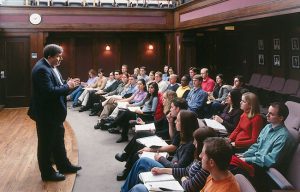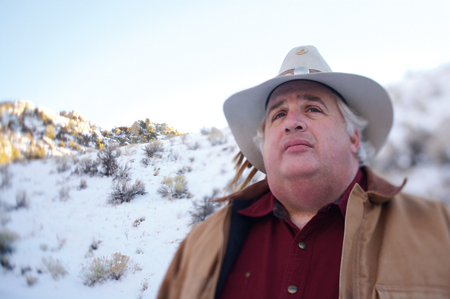
Faculty members’ willingness to share their wealth of knowledge with students is helping BYU become a consecrated place.
By Elder Henry B. Eyring
Through sacrifice and consecration BYU can become a place where the Lord would be comfortable.
It is useful to put a picture in our minds and hearts of where we are headed at BYU and why we are going there. That is easier to do at BYU because living prophets of God have described our possibilities. I have studied two of those pictures of the future. The two views combine for me to make more clear what we should do and who we must become.
President George Albert Smith ended his remarks at the first dedication of the Eyring Science Center on Oct. 17, 1950, with this prayer and blessing:
Oh, Father, bless the men and the women who are on the faculty of this great school that they may teach . . . under the influence of Thy Spirit, that they may be able to inspire the . . . men and women with the desire to be worthy to be called Thy children. Bless them that they may see the fruits of their labors, . . . that they may look over a field of Thy sons and daughters who have been developed to be worthy to live with Thee. [BYU Archives]
That picture of our students worthy to live with God might have seemed to be in some distant future, in the world to come, if I had not next read this from President Spencer W. Kimball’s second-century address (“The Second Century of Brigham Young University,” Speeches of the Year, 1975 [Provo: BYU Press, 1976], pp. 250–51):
We must not lose either our moorings or our sense of direction in the second century. We still have before us the remarkable prophecy of John Taylor when he observed:
You will see the day that Zion will be as far ahead of the outside world in everything pertaining to learning of every kind as we are today in regard to religious matters. You mark my words, and write them down, and see if they do not come to pass. [Journal of Discourses (London: Latter-day Saints’ Book Depot, 1854–86), vol. 21, p. 100]
Surely we cannot refuse that rendezvous with history because so much of what is desperately needed by mankind is bound up in our being willing to contribute to the fulfillment of that prophecy. Others, at times, also seem to have a sensing of what might happen. Charles H. Malik, former president of the United Nations General Assembly, voiced a fervent hope when he said that one day a great university will arise somewhere—I hope in America—to which Christ will return in His full glory and power, a university which will, in the promotion of scientific, intellectual, and artistic excellence, surpass by far even the best secular universities of the present, but which will at the same time enable Christ to bless it and act and feel perfectly at home in it.[“Education in Upheaval: The Christian’s Responsibility,” Creative Help for Daily Living 21 (September 1970): 10]
Malik described a place—a university—where the resurrected Lord would join with the students and the faculty and all who labor there. The Master will feel perfectly at home there.
We know something of what a place must be like for the glorified Savior to feel perfectly at home. Of one thing we can be sure: those who labor there and all associated with it will have long before consecrated it to Him and to His kingdom.
His plan of redemption has always required men and women to consecrate all they have and all they are to the service of God. They covenant to do that. And then He tests them to see how sincere they are and how much they are willing to sacrifice.
Those who welcome Him at that university will have met and passed the tests. He will be perfectly at home because they will not only have said the words “This is the Lord’s university,” but they will have served and lived to make it so. They will have made it a consecrated place and offered it to Him, and in the process they will have been sanctified. What they will have done to prove their consecration will have allowed the Atonement to change who they are.
One way to know the Atonement is changing us is that we are moving toward, not away from, consecration. I see it in the eyes of the students, especially in students who have been trusted with great responsibilities. Involving students in serious research, in service projects, and in caring for the campus has drawn from them sacrifice in time and effort beyond what was true just a few years ago. That is changing them, and it is changing this place.
One of the characteristics of a place where the Savior can come is that there will be no class of people that holds itself above another. Think of how foreign that is to the nature of most university life.
Yet faculty have enriched the learning of students by letting them share in their professional lives. Students come poor in what they know about things faculty have worked years to understand. Yet they have welcomed undergraduates into their worlds as partners. That will give them powerful advantages when they go on to graduate school and to employment. In the process of giving equal value to student contributions, faculty have changed this place. In the great day when the Master comes, the people will have “all things common” (Acts 2:44; 4:32) and there will be “no poor among them” (Moses 7:18). If I had not seen what I have seen here, I would not have thought that possible in universities, where rank and status have always been so carefully guarded.
There is another way in which I see an increase in consecration. I see more people who care about how much they can give the Master, almost forgetting to ask what they will get in return. A man was in my office recently. He had just assumed a new title and a greater responsibility. Before he accepted, he forgot to ask about any change in salary. He had given his all as a teacher. He expected to give his all in his new position. His pay as a teacher was enough to meet his family’s modest needs. And so he expressed great surprise that his pay was to increase.
His surprise told me something about him that he could not see. He had met and passed one of the tests of consecration. His giving his all was not for him a sacrifice, and so he ceased to calculate any expected return. He wasn’t looking sidewise to see what others in comparable positions received or what he might get for himself in another place. Instead of looking to the side, he was looking up. And so he was changing the place he was in. I realize that such an attitude is rare. But it is becoming less rare here.
It is not only those who work and study at BYU who are consecrating this place. I was recently with members of the Church in Latin America. There I met full-tithe payers who struggle for economic survival. One great leader, a medical doctor, lost his employment for months. To feed his family he turned to the manual work he had done to put himself through medical school. He had borrowed to get food. The loan was coming due, and he saw no way to pay it. And yet through it all, week by week, he paid tithing on his tiny earnings. His only concern was that God would help him to keep his covenants.
I thought of this place as I listened to him. He will never come here, nor will his children. But his tithes, combined with the offerings of millions of covenant Saints across the earth, come to this place because the Lord trusts and blesses us. I can see only dimly His purposes in making us so dependent on tithing, but surely those purposes include the humbling of those who receive as well as His exalting the poor for their keeping their promise of consecration.
All of the sources of funding for this university help to make it a consecrated place. The tithing comes mostly from members of modest means. Other funding comes from donations. What appear to be gifts coming out of affluence frequently require great sacrifice and consecration. I remember a luncheon with a man and his large family. He had in his early years promised the Lord that any surplus would go to the kingdom of God. Now the married children gathered as the father and the mother gave away what in any other family might have been seen as the very large and rightful inheritance of the children. I remember that luncheon every time I am tempted to say, “Well, we can always pay it out of the endowment,” as if somehow those funds were less precious and less the Lord’s.
In a place where the Savior can come, the poor will be exalted. They will have the chance for education. It will be funded by consecrated offerings. And costs will be less—far less—because those who provide the education will treat all funds as sacred.
And where the tuition is beyond the means of the poor, whatever they need in aid they will be trusted to pay back to benefit those who follow. We can be confident that the poor with training can lift themselves to bless others and thereby decrease their feelings that they are helpless victims and increase their sense of dignity as children of God. They can be led away from selfishness and toward consecration.
The journey toward being a consecrated place is a long one. We have not arrived, but we are moving on the path. There will be tests ahead—not because God doubts us but because He loves us. I have every confidence that we will pass the tests and that BYU will respond to the call to be a consecrated place.
This article is condensed from an address given by Elder Henry B. Eyring, a member of the Quorum of the Twelve Apostles of the Church of Jesus Christ, at BYU‘s Annual University Conference on Aug. 27, 2001. The full text is available at speeches.byu.edu/auc/01AUC_Eyring.html.









